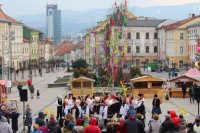
 From 29 March to 1 April, Slovakia celebrated the Easter holidays. Easter (Veľká noc) is one of the favourite religious holidays in Slovakia.
From 29 March to 1 April, Slovakia celebrated the Easter holidays. Easter (Veľká noc) is one of the favourite religious holidays in Slovakia.
The Catholic Easter has many similarities with the Orthodox Easter, but there are also differences. Similarly, to the Orthodox, Catholics in Slovakia prepare for the holiday in advance. It is customary to do Easter cleaning (veľkonočné upratovanie), buy local delicacies and make Easter decorations. Festive fairs and concerts are held in the squares of towns and villages.
A week before Easter Sunday, Christians celebrate Palm Sunday. But in Slovakia it is not called Palm Sunday, but Flower Sunday (Kvetná nedeľa). The traditional Maundy Thursday is called Zelený štvrtok. On this day, it is common to eat dishes made of green-coloured foods, such as spinach or savoy cabbage. Good Friday (Veľkonočný piatok) commemorates the crucifixion of Jesus Christ. On Easter Saturday (Veľkonočná sobota) in Catholic churches, as well as in Orthodox churches, festive food is lit and the 40-day fast comes to an end. Easter Sunday (Veľkonočná nedeľa) is spent with family or going out to visit. Festive dishes vary from region to region, but everywhere you will be treated to festive chicken soup, smoked meat and sausage, cheese and of course boiled eggs. Homemade alcohol is also present on the festive table.
On Easter Monday (Veľkonočný pondelok), one of the most characteristic Easter traditions in Slovakia is the dousing and whipping ceremony (Šibačka). It is a joyful and happy day. According to an old tradition, young men and boys visit the homes of their girlfriends, friends and relatives to symbolically "whip" them with braided willow twigs (korbáč) and douse them with water. This ritual is supposed to bring health, beauty and happiness. As a reward, men are given coloured eggs (kraslice), sweets or cakes and money. Nowadays in cities this tradition has changed and girls are simply sprayed with perfume.
Many traditions, unfortunately, change or become a matter of the past with time. Let's try not to forget the value of our traditions!
Author, translation: Ľubica Skořepová


